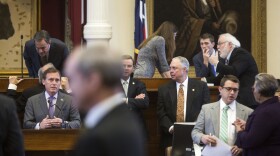Democrats are running in every single Texas congressional race. But that doesn’t mean they’ll win – especially when you consider each of the districts was drawn to re-elect the party that currently holds the seat (i.e., mostly Republicans).
There is, for now, more enthusiasm for Democrats in general across the country. But we won’t really know until after the primaries whether that enthusiasm lasts and translates into wins this November for Democrats here in deep-red Texas.

Either way, here’s a quick rundown of the seven congressional races in Central Texas:
Congressional District 10
Republican incumbent Michael McCaul has a GOP challenger, John Cook, in the primary. If he wins, he’ll take on the winner of a seven-person field on the Democrats side in November:
Congressional District 15
Republican Congressman Vincente Gonzalez has no primary opponent. He'll face Democrat Tim Westley, also unopposed in the primary, in November.
Congressional District 17
Republican incumbent Bill Flores doesn’t have a primary opponent. He’ll be vying against the winner of the Democratic primary, Dale Mantey or Rick Kennedy, who is trying to flip the seat this fall.
Congressional District 21
Longtime incumbent Lamar Smith is retiring. That’s opened up a torrent of potential replacements. There are 18 Republicans running to represent the district that runs from South Austin to North San Antonio. Four Democrats are also running to make the November ballot.
Republicans:
- Al M. Poteet
- Anthony J. White
- Autry J. Pruitt
- Chip Roy
- Eric Burkhart
- Foster Hagen
- Francisco "Quico" Canseco
- Ivan Andarza
- Jason Isaac
- Jenifer Sarver
- Matt McCall
- Mauro Garza
- Peggy Wardlaw
- Robert Stovall
- Ryan Krause
- Samuel Temple
- Susan Narvaiz
- William Negley
Democrats:
Congressional District 25
Republican incumbent Roger Williams doesn’t have a challenger in March, but five Democrats have jumped in for the chance to take him on in November.
Democrats:
Congressional District 27
Republican Rep. Blake Farenthold will not run for re-election, following the revelation that he paid $84,000 to settle a 2014 sexual harassment lawsuit. Six Republicans are fighting to replace him; four Democrats are running.
Republicans:
Democrats:
Congressional District 31
Longtime incumbent Republican John Carter has picked up a GOP challenger, Mike Sweeney. Four Democrats are vying to challenge him in the general election.
Democrats:
Congressional District 35
Democratic incumbent Lloyd Doggett doesn’t have a challenger in March. There are two Republicans, David Smalling and Sherrill Kenneth “SK” Alexander, competing in March to face him in November.
TXDecides
KUT, along with public radio stations across the state, are taking your questions about the March primaries. That includes everything from who’s running to how to register to vote.
Today, we answer two questions from Donna Lane.
Can I change my vote after the primary? Will the incumbents be marked on the ballot?
Let’s answer the first question under two different scenarios. If you voted for Candidate A in a primary and nobody received 50 percent of the vote, sending the top two candidates to a runoff election, could you vote for a different candidate? Yes.
If you voted for Candidate A in the primary, and that candidate makes it to the general election in November, could you vote for any other candidate? Yes.
Will incumbents be marked on the ballot? No, they may also not be listed first for that office. There have been several instances in primary elections where the first candidate listed has won. That could be because the race did not receive enough media attention or candidates failed to do much campaigning, so people just voted for the first name on the ballot.
We’ll have more information next week on the primary races. And remember, if you have a question about the primaries send it to our TXDecides project.
_





